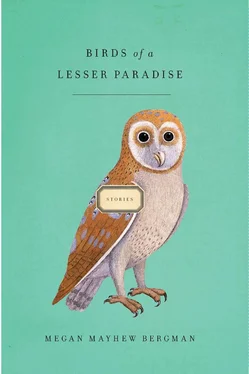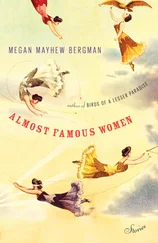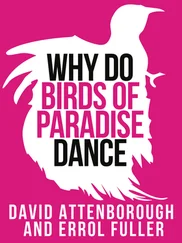One morning, five months into our breakfast routine, I slid into the booth next to him just as the waitress was handing him a menu. He smiled at me and did not waste time placing his order.
Fried chicken and hotcakes, he said. Thank you, ma’am.
Try and write a review without the words tender and crispy, I said. Can you do it?
Ella’s had six booths and a lunch counter. Al liked to watch the fishermen, fresh off the morning’s boats, order biscuits and gravy. The booth stuck to the undersides of our thighs. The linoleum floor peeled underneath the chair legs. An air-conditioning unit hummed and dripped in the corner window. There was a display of Lance snack foods next to the counter that no one ever touched, though the honey-bun package said bakery fresh! Ella was long dead, her skillet bronzed and mounted on the wall. The short-order chefs, former marines from the nearby base, were large and sweaty and peered through the window behind the counter. The menu was listed on a ribbed plastic board that hung next to Ella’s skillet. Underneath were stacks of newspapers and a gum and cigarette machine.
I liked eating at Ella’s because it was sacred to a few loyal customers but otherwise seemed forgotten. It was a quiet place, a time warp that reminded me of growing up in the South, going out to lunch with my father after his golf game, or eating with my mother during a shopping trip. At Ella’s I didn’t feel like anyone’s wife; I felt like my old self.
Did you know they have three types of ham here? Al asked. Country, city, and Virginia country. I’ve never counted before, he said.
Each morning went like this. Margie, the waitress, fussed over Al’s hair, smoked as she topped off his mug. After ordering, we’d watch Mussolini, the small Italian man who owned the market across the street, open up his shop. Mussolini stocked sauce, cheese, wine, and pasta. He arrived each morning with his large white dog, who rode in the front seat of his van.
For weeks I’d been feeling sorry for Mussolini. He looked like a tragic character, balding and stooped, and his shop didn’t seem to do a lot of business. He lived nearby and kept his dog outside his house at night, chained to an oak tree. I’d seen the dog on my insomnia-fueled walks.
Look at him, I said. A sad man. Weighed down by his name.
Do you want cheese grits, Cajun grits, or plain? Al asked.
I’m feeling downright humble, I said. Plain with butter, please, sir.
Al’s book Eating the Americana Way was under contract, and we were planning a party at Ella’s to celebrate. It was a good distraction for me. I needed something to take my mind off of my husband. Last year I’d found a note I did not write in Nate’s pocket: Imagine what I can do with my entire body.
Nate and I still talked on Fridays. He was always the one to make the call. Never me.
Every time we spoke, he said he wanted me back, even after the months I’d spent here in bed with two cats.
I don’t really need a man in my life right now, I’d tell him. You gave me an out.
Nate was an animal behaviorist from California who’d come to North Carolina for further training at the state veterinary school. He’d started off as a condor nesting specialist, then turned to academia. I’d studied politics but began catering weddings after college. I wanted to go to law school but was afraid to take out the loans.
We are married, he told me. It’s the same pot.
I want to pull my weight, I said. Not take three years out of working and acquire six figures of debt.
During our relationship, I’d often complained of feeling trained. I rejected bouquets and chocolates as positive feedback. How’s this any different from rabbit meat? I’d ask, picturing myself a hooded bird clutching his arm in anticipation of a reward.
Don’t be so principled, he’d say. Let me spoil you. Let me feel necessary.
But even when we were together I kept my own bank account and a separate group of friends I could go out with when he worked late. I liked to have a contingency plan — people died, spouses cheated. My father had left my mother for a family friend when she was fifty-three, and I’d seen the damage it had done. Before he left, my mother had never lived alone or worked. She shut down afterward, only going to church and running the occasional errand. I wanted to keep my independence tangible, not be forced to find it late in life.
There were things about Nate I didn’t like. One, he wasn’t a dog lover and refused to let me keep one in the house. What kind of man didn’t like dogs? He also was addicted to exercise and hated cooking, sometimes choosing to slice fresh bananas over instant oatmeal for breakfast and dinner instead of eating the meals I’d prepared. He cringed when I made pies. All that butter, he said.
When we talked after my move, Nate closed each conversation with a question: Are you happy?
I always lied. Each day in Abbet’s Cove felt like an audition. I was learning the layout of the grocery store, how to walk the hot sidewalks in my bare feet. Aside from Al, I had not made friends. The locals had cancered faces, sun-white hair, and scratched boats. They wore gold-rope jewelry and boat shoes and drank beer in the morning on the boardwalk. I wondered if you could love a town despite its people.
I had one friend, Rhea, who called every week and wanted to visit. She thought I’d made a rash decision. I’m concerned, she said. Rhea worked the late shift at an animal shelter in the town an hour west of where I’d lived with Nate. She cared for incontinent cats. Rhea was outdated, her hair permed and jeans cuffed. She talked like a bus driver. I’d known her since I was five.
She came by one afternoon after my breakfast with Al, bursting into the house, smacking her gum. I like this place more than I thought I would, she said. It fits you. Needs more furniture, though.
I followed Rhea through the house as she wandered down the hallway and peered in each room. She stopped in my bedroom and walked toward the bed.
Wash your hands before you sit down, I said.
Already washed, she said, showing me her palms and sitting down on my coverlet, which was covered with cat hair. How are you?
I’m okay, I said. I’m thinking of getting some catering gigs going down here.
How’s Al? she asked. Are you sleeping together yet?
He’s fat, I said. Which means we can focus on other things.
Rhea kneeled on my bed and touched Mary’s face. One of my nameless cats straddled the headboard like a tree branch and sniffed at Rhea’s hands, agitated, tail flicking.
What’s this bullshit? Rhea asked, pointing at Mary. You’ve never been religious.
I talk to her about men, I said. Haven’t I told you? I’m giving them up.
Rhea suggested that as the Christchile’s mother — and she said it like that — Mary probably had an entourage of hair and makeup professionals who followed her around the Holy Land in case she had her portrait painted.
It’s easy to be beautiful, Rhea said, when you have an entourage.
I stroked the cat’s chin.
What do you think Mary’s going to do for you? Rhea said.
Have you ever thought about what it would be like, I said, if sex wasn’t important? If it didn’t matter? If you could just go on about life as a happy, single person? Why don’t more people do that?
I think you’re getting weird here, Rhea said, blowing a bubble with her gum.
A doctor I’d once seen for my insomnia had explicit instructions: “Use the bed only for sleeping and sex.” I asked Rhea to put out or get off the bed. She hugged me and went home to her husband and kids, to the place where she belonged.
I left Nate the night I found the note in his pocket. I dropped my wedding ring in the gravel lot of the Abbet’s Cove Piggly Wiggly, where I’d stopped to buy a twelve-pack of anything. I left it there.
Читать дальше












